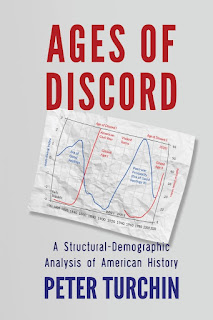Books+ Winter 2024
I explore ideas and thinkers by binging on them until I understand their weft and warp and can also see their holes and weak fibers. So, my reading list right now is largely works by authors I've already discussed as well as some new (old) works that, believe it or not, are a trip back to my odd childhood.
Peter Turchin
As I mentioned above, I like to binge interesting authors, composers, artists, etc. I was first drawn to Turchin's work because I couldn't believe anyone would publish a book that was essentially an enactment of Asimov's Foundation series. But Turchin's attempt to apply a scientific approach to understanding meta-history ("cliodynamics," not "psychohistory" for you Asimov fans) is compelling, and a binge was born. I've read most of his books now and, while I have thoughts here and there on some of his analyses, his overall approach does seem worthy of continued investment and pursuit alongside traditional history. It's an apolitical, 10,000-foot look at human and local history. Read Turchin if you want to step out of the heat of the moment and understand the base principles of human society.
Ages of Discord: A Structural-Demographic Analysis of American History by Peter Turchin
Read if you want a high-level analysis of the overall shapes of American history, including what might be in store for us in the future. It's refreshing to read a truly apolitical version of our history.
End Times: Elites, Counter-Elites, and the Path of Political Disintegration by Peter Turchin
Read if you're worried about the future of our country and world.
Ultra Society: How 10,000 Years of War Made Humans the Greatest Cooperators on Earth by Peter Turchin
Most history courses start in ancient Mesopotamia or Egypt. This book starts far earlier and examines some of the paradoxes of, for example, why the earliest humans went from being fairly egalitarian to violently hierarchical given that they had effective systems in place for managing/killing power-hungry upstarts. Turchin presents some theories he's tested to solve this paradox, many of which seem plausible, but I wonder whether he has overlooked the additional role of ambitious mothers in the rise of the god-kings of pre-history. Violent, alpha men clearly got far in that time through their relationship with budding military structures and the cascading cultural impacts of agriculture, but women have always been the master moralizers who lead the enforcement of cultural consensus supporting ideas and people in seemingly every society. A subtheory worth testing, Mr. Turchin? This book also gave me a new appreciation of shoulders.
War and Peace and War: The Rise and Fall of Empires by Peter Turchin
Read this book if you have a strong stomach for reality. Turchin theorizes that, as horrible as it is, conflict/war along borders has been the driver of the rise of empires. And the dissolution of internal cohesion/cooperation in a society is what has led to the fall of empires. Mildly relevant, to say the least.
The Matter with Things: Our Brains, Our Delusions, and the Unmaking of the World by Iaian McGilchrist
I wrote about McGilchrist's more well-known tome, The Master and His Emissary, in my previous book series post. I picked up these next two bricks because I'm intrigued by McGilchrist's promise to extend his discussion of the dispositions and roles of our two brain hemispheres into the realm of both consciousness and--hold your hats--space and time. Talk about a book pitch. I am mere inches into volume one of this new book set but am already hungry to forgo obligations such as cooking in favor of reading on. There are so many connections that can be drawn between what McGilchrist is discussing and all the hot-button issues of our time. It's cause for both optimism and depression.
The Gulag Archipelago, 1918-1956: An Experiment in Literary Investigation (Volume One) by Aleksandr Solzhenitsyn
Without going into great detail, let's just say that I had a lot of exposure to radical Marxist thinking and groups when I was quite young. That fizzled out, but I've since spent time trying to make sense of what went unsaid and unacknowledged in my family during those years, including the way that any form of ideology tangles--however unconsciously--with personal needs and problems, as well as the benefits and perils of ideology in general. To that end, I'm reading Solzhenitsyn's famous expose of the full horrors of the prisons and labor camps in Soviet Russia. My eye lingers less on the depravities of the camps (which are inventive in the worst way) and more on the vast, consenting social structure required to support the evil at work.
A Farewell to Arms by Ernest Hemingway
I had a thing for reading Hemingway when I was a tween and teen. My mother even used to buy me books of bad Hemingway parodies, which I thought were the height of hysterical. I eventually figured out that this wasn't either cool or en vogue in the literary world and distanced myself from the habit, so it's been a long time since I've read Hemingway. But I'm glad I picked up A Farewell to Arms recently. Time stretches back out into its fullness when you read prose by someone who spent his downtime staring at hills, not Netflix.
---






